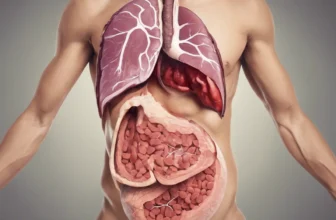
Hormonal imbalances can affect women in various ways. From mood swings to weight changes, it’s important to recognize the signs. Let’s dive into 20 common symptoms to watch out for.
Mood Swings

Mood swings can make you feel happy one moment and sad the next. This can be really confusing and might affect how you interact with friends and family. Understanding this can help you manage your emotions better.
These sudden changes in mood might be due to hormonal imbalances. Hormones play a big role in how we feel, and when they’re off-balance, it can lead to unpredictable emotions. Being aware of this can help you find ways to stay calm.
Mood swings can disrupt your daily life, making it hard to focus on work or enjoy activities. Finding ways to manage stress, eat well, and get enough sleep might help stabilize your mood and improve your overall well-being.
Weight Gain

Gaining weight unexpectedly, especially around your belly, could be a sign of hormone problems. Even if you eat well and stay active, these changes can still happen. It’s important to check with a doctor if you notice this issue.
Sometimes weight gain happens because of stress or lack of sleep. When you’re stressed, your body might produce more cortisol, a hormone that can make you gain weight. Getting enough rest and managing stress can help keep this in check.
Certain medical conditions like thyroid problems or PCOS can also cause weight gain. These conditions affect how your body uses energy, leading to weight increases. If you suspect you have a medical issue, it’s best to consult a healthcare professional.
Fatigue

Feeling tired all the time, even after resting, could mean something more. Hormone problems can sap your energy, making daily tasks tough to handle.
Sometimes, a hormone imbalance can make you feel sluggish and worn out. It’s like your body is always running on low battery, no matter how much rest you get.
When your hormones are out of whack, it can feel like you’re dragging through each day. This constant tiredness isn’t just about lack of sleep; it’s a sign that something else might be going on.
Irregular Periods

If you notice that your periods are irregular or you miss them often, it might be due to hormonal changes. Keeping track of these changes and discussing them with your doctor can help identify any underlying issues early on.
Irregular periods can be caused by various factors, including stress, significant weight loss or gain, and certain medical conditions. Understanding what might be causing these changes is important for maintaining your overall health.
Monitoring your menstrual cycle helps you stay informed about your body. If you experience irregular periods, it’s a good idea to consult with a healthcare professional to explore possible reasons and get appropriate advice or treatment.
Sleep Problems

Trouble falling asleep or waking up often could be due to imbalances in your hormones. When you don’t rest well, it can affect your overall health and mood, making it harder to stay energized during the day.
Hormonal changes, such as those during menopause or stress, might disrupt your sleep patterns. These changes can lead to less restful sleep, which in turn can negatively impact your physical and mental health over time.
Improving your sleep hygiene, like maintaining a regular sleep schedule and creating a comfortable sleep environment, can help. Addressing potential hormonal issues with a healthcare provider might also improve your sleep quality and overall well-being.
Skin Changes

Hormonal changes can cause skin issues like acne, dry patches, or oily skin. These changes might be annoying and can impact how you feel about yourself.
Fluctuations in hormones often lead to breakouts or overly dry skin. This can be frustrating, especially when it happens unexpectedly.
Excessive oiliness or sudden dryness can affect your skin due to hormonal imbalances. These shifts can make you feel less confident about your appearance.
Hair Loss

Losing hair for no clear reason can be concerning. Changes in hormones often disrupt hair growth, making it fall out more than usual. This can happen to anyone and noticing the signs early can help in managing it better.
Hormonal imbalances, such as those caused by stress, pregnancy, or thyroid issues, can lead to hair thinning. It’s important to understand that this type of hair loss might be temporary and addressing the underlying cause can improve the situation.
Aside from hormonal changes, factors like diet, medication, and genetics also play a role in hair loss. Ensuring a balanced diet and consulting with a healthcare provider can help you identify the root cause and find appropriate treatments.
Low Libido

A drop in sexual desire might be due to hormonal issues. These changes can impact your closeness with your partner and influence your overall relationship satisfaction.
Sometimes, stress and lifestyle choices can lead to a lower sex drive. Finding ways to relax and making healthier decisions may help boost your libido.
Certain medications can also affect your desire for intimacy. If you’re noticing changes, it might be worth discussing with your doctor to explore possible solutions.
Digestive Issues

Hormonal imbalances can mess with your digestion, leading to problems like bloating, constipation, or diarrhea. These issues can really throw off your daily routine and make you uncomfortable.
When your hormones are out of whack, it can affect how your stomach and intestines work. This might cause you to feel bloated or have trouble going to the bathroom regularly.
Dealing with digestive problems due to hormonal issues can be tough. It’s important to find ways to manage these symptoms to keep your day-to-day life running smoothly.
Hot Flashes

Hot flashes are common during menopause and cause sudden warmth, especially in the face and upper body. These episodes can last from a few seconds to several minutes, often leaving you sweaty and uncomfortable.
Many women find that certain triggers like spicy foods, alcohol, or stress can make hot flashes worse. Identifying and avoiding these triggers can help manage the frequency and intensity of hot flashes.
While hot flashes are generally harmless, they can disrupt daily life and sleep. Simple lifestyle changes, such as dressing in layers, using fans, and staying hydrated, can provide some relief and improve comfort.
Memory Problems

Having trouble remembering things or focusing can be a sign of hormone imbalances. These issues can affect your job and personal life, making daily tasks more difficult.
Hormonal changes can influence brain function, leading to memory lapses and poor concentration. Keeping track of your hormone levels can help manage these symptoms better.
If you find it hard to concentrate or often forget things, it might be worth checking your hormones. Simple tests can provide answers and help improve your mental clarity.
Headaches

Hormonal changes can lead to frequent headaches or migraines, which can severely impact your daily routine. It’s important to recognize the triggers and manage them effectively to reduce their occurrence.
Certain times in life, like puberty, menstruation, pregnancy, and menopause, can cause hormonal fluctuations that might bring on headaches. Keeping a symptom diary can help identify patterns and manage these headaches better.
Simple lifestyle changes like staying hydrated, maintaining a regular sleep schedule, and managing stress can help alleviate headaches caused by hormonal shifts. Consulting a healthcare professional can provide personalized strategies and treatments.
Breast Tenderness

Breast tenderness often happens due to hormonal changes. These fluctuations can make the breast tissue feel sore or swollen, causing discomfort. This is a common experience and can occur during various stages of life, like puberty, menstruation, or pregnancy.
Another reason for breast tenderness is water retention, which can cause swelling and pain. This usually happens before your period, as hormone levels change. It’s important to note that while it can be uncomfortable, it is typically a normal part of the menstrual cycle.
Certain medications can also lead to breast tenderness as a side effect. Hormonal treatments, birth control pills, and some antidepressants are common culprits. If you notice pain after starting a new medication, consult your doctor to discuss your symptoms.
Anxiety

Feeling anxious or panicky can sometimes be due to hormonal imbalances. These imbalances can mess with your mental health and overall well-being, making it important to address both your physical and emotional health.
Hormones play a key role in regulating emotions. When they’re out of balance, you might experience heightened anxiety or stress. Keeping an eye on your hormonal health can help manage these feelings better.
Anxiety linked to hormonal changes can also affect your sleep and energy levels. Addressing these imbalances through lifestyle changes or medical advice can improve your mood and overall quality of life.
Depression

Feeling down for a long time might be a sign of depression. Hormones help control our mood, and when they’re out of balance, they can cause mental health problems.
Depression can make everyday tasks feel overwhelming. Hormone imbalances can affect our brain chemistry, leading to mood swings and persistent sadness.
It’s important to pay attention to prolonged sadness. Hormones like serotonin and dopamine play a big role in how we feel, and an imbalance can lead to depression.
Cravings

Strong cravings for certain foods, especially sweets, can occur due to hormonal changes. These urges might make you reach for sugary snacks more often, impacting your diet and possibly your weight.
Changes in hormones can lead to a rise in appetite for specific foods, particularly those high in sugar. This can interfere with your usual eating habits and make it harder to stick to a balanced diet.
Noticing a sudden desire for sweets? This could be your body’s way of signaling hormonal shifts. These cravings can influence your food choices and overall health if not managed carefully.
Joint Pain

Hormonal imbalances can cause unexpected joint pain or stiffness. This discomfort can make it hard to move around and do everyday activities. If you’re experiencing these symptoms without a clear reason, it might be worth discussing your hormones with your doctor.
Changes in hormone levels, especially during menopause or thyroid issues, can lead to joint pain. This type of pain can affect your knees, shoulders, and other joints, making it tough to stay active. Identifying the cause can help manage and reduce the pain.
Joint pain from hormonal changes can be managed with a combination of lifestyle adjustments and medical treatments. Simple changes like a balanced diet, regular exercise, and proper rest can make a big difference. Consulting with a healthcare professional for personalized advice is always a good idea.
Dry Eyes

If your eyes feel dry or irritated, it could be because of hormone changes. This can make your eyes uncomfortable and might even blur your vision.
Spending too much time staring at screens or being in dry, windy environments can also lead to dry eyes. Simple changes like blinking more often or using a humidifier can help.
Certain medications or health issues, like allergies, can make your eyes dry. It’s a good idea to check with your doctor if you’re experiencing ongoing discomfort.
Body Temperature Changes

Feeling too hot or too cold can be unsettling. These changes in body temperature might be a sign of something going on with your health. It’s important to pay attention and see if there are any patterns or other symptoms.
Sometimes, body temperature changes can be related to stress, diet, or even the environment. If you’re experiencing these fluctuations often, it might be helpful to look at your daily habits and see if there’s a connection.
Certain medical conditions can also cause temperature fluctuations. If you notice that you’re frequently feeling too hot or too cold without an obvious reason, it might be worth discussing with a healthcare professional to rule out any underlying issues.
Thinning Eyebrows

Thinning eyebrows can hint at hormonal issues. This might be due to imbalanced hormones affecting hair growth. Keeping an eye on such changes can help in early detection of underlying health concerns.
Apart from hormonal imbalances, thinning eyebrows may also result from poor nutrition. Adequate intake of vitamins and minerals is crucial for healthy hair growth. Ensure your diet includes essential nutrients to support your overall well-being.
Stress can also play a significant role in eyebrow thinning. High levels of stress may disrupt your body’s normal functions, including hair growth. Managing stress through relaxation techniques can help maintain healthier eyebrows.
Conclusion
Understanding the signs of hormonal imbalance can help you take action and seek the right medical advice. If you’re experiencing any of these symptoms, don’t hesitate to consult with a healthcare professional. Your well-being is important, and addressing these issues can lead to a healthier, happier life.





